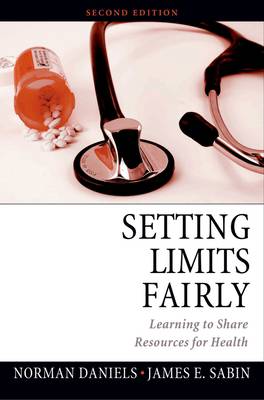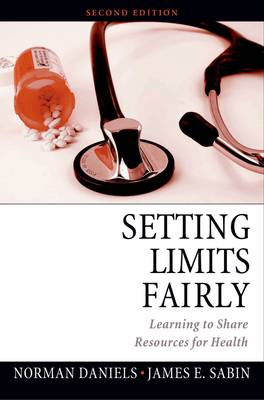
- Afhalen na 1 uur in een winkel met voorraad
- Gratis thuislevering in België vanaf € 30
- Ruim aanbod met 7 miljoen producten
- Afhalen na 1 uur in een winkel met voorraad
- Gratis thuislevering in België vanaf € 30
- Ruim aanbod met 7 miljoen producten
Zoeken
Setting Limits Fairly
Learning to Share Resources for Health
Norman Daniels, James E Sabin
Paperback | Engels
€ 93,45
+ 186 punten
Uitvoering
Omschrijving
The central idea behind this book is that we lack consensus on principles for allocating medical resources -- and in the absence of such a consensus we must develop and rely on a fair decision-making process for setting limits on health care. Daniels and Sabin provide a cogent analysis of the current situation, lucidly review the usual candidate solutions, and describe their own approach. The audience for the book is global since the problem of limited resources cuts across types of health care systems whether or not they have universal coverage. In its first edition the book stimulated considerable work on setting priorities in health care, both here and abroad. The revision adds new material to the book, including several chapters by Daniels on new international research data from Mexico and Canada, and a new chapter on managing pharmacy benefits. Having the book available in paperback will also extends its influence, particularly as the topic grows in importance.
Specificaties
Betrokkenen
- Auteur(s):
- Uitgeverij:
Inhoud
- Aantal bladzijden:
- 280
- Taal:
- Engels
Eigenschappen
- Productcode (EAN):
- 9780195325959
- Verschijningsdatum:
- 22/02/2008
- Uitvoering:
- Paperback
- Formaat:
- Trade paperback (VS)
- Afmetingen:
- 160 mm x 232 mm
- Gewicht:
- 403 g

Alleen bij Standaard Boekhandel
+ 186 punten op je klantenkaart van Standaard Boekhandel
Beoordelingen
We publiceren alleen reviews die voldoen aan de voorwaarden voor reviews. Bekijk onze voorwaarden voor reviews.











